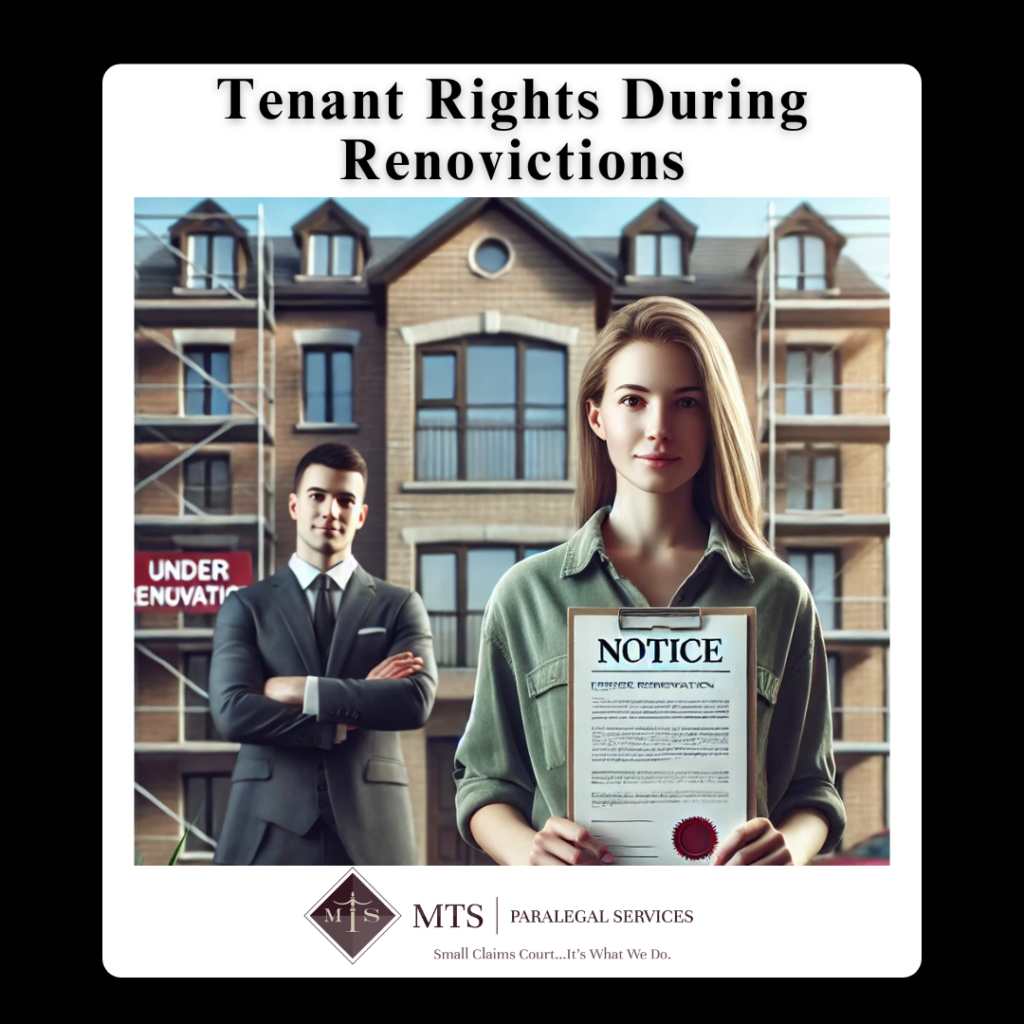
Understanding Tenant Rights During Renovictions in Ontario
Tenant rights in Ontario are a vital concern for renters, especially as the housing market becomes more competitive and landlords look for ways to increase rent prices. One growing issue is the practice of renovictions, where tenants are evicted under the pretext of major renovations. Knowing your tenant rights is crucial when facing such a situation, as it can help you protect yourself from wrongful evictions and ensure that you are treated fairly. Tim, the experienced paralegal at MTS Paralegal Services, can help you navigate these difficult situations and make sure your legal rights are upheld.
What Is a Renoviction?
A renoviction occurs when a landlord evicts tenants to carry out renovations on a rental unit. While landlords are allowed to perform necessary repairs under Ontario’s Residential Tenancies Act, they must follow strict legal procedures. It’s important to note that simply planning renovations does not give landlords an automatic right to evict tenants. Many landlords misuse this tactic as a way to remove tenants, make upgrades, and then raise the rent for new tenants. Understanding your tenant rights in this context is essential, as landlords must provide specific reasons and follow a clear legal process before evicting someone for renovations. Tim regularly advises tenants on how to handle these notices, ensuring that all required steps are followed by the landlord.
When Is a Renoviction Justified?
Renovictions are only justified under specific conditions. A landlord can ask a tenant to vacate a rental unit only if the renovations are so extensive that they cannot be completed while the tenant remains in the home. However, even in such cases, tenant rights are clearly defined by law. Tenants must receive proper notice, which includes a written Form N13 that gives them at least 120 days to vacate the property. In addition to the notice, tenants are entitled to financial compensation in most cases. This compensation is usually three months’ rent or the offer of another rental unit in the same building. Tim often helps tenants understand these legal requirements and advocates for them when landlords fail to comply.
One of the most important tenant rights in Ontario is the right to return to the rental unit once the renovations are complete. If a tenant chooses to move back into the unit after renovations, they are entitled to pay the same rent as before, with only the legally allowable increases. Many tenants are unaware of this right and assume that once they move out, they have no claim to the unit. Tim advises tenants to keep track of their communication with the landlord and ensures that all legal obligations are met, including the right to return to the property.
Tenant Rights to Challenge Renovictions
Tenants in Ontario have strong protections when it comes to renovictions, and they have the right to challenge an eviction notice if they believe it is unjustified. One of the first steps a tenant can take is to request proof from the landlord that the renovations actually require the unit to be vacated. Landlords must provide legitimate reasons and may be required to submit building permits or other documentation to prove the necessity of the eviction. If the tenant is not convinced, they can take their case to the Landlord and Tenant Board (LTB), where Tim can represent them. Tenant rights are a critical aspect of these proceedings, and Tim ensures that his clients are well-prepared to present their case.
It is also important to remember that landlords cannot pressure tenants into leaving without following the legal eviction process. Some landlords attempt to push tenants out by starting renovations without the proper permits or by offering informal deals to convince tenants to leave. Tenants should be wary of these tactics and make sure they are informed about their tenant rights before agreeing to anything. Tim is skilled at identifying these unlawful strategies and can step in to make sure the landlord complies with the law.
Protect Your Tenant Rights with Professional Help
When faced with an N13 notice, tenants should take immediate action to protect their rights. The first step is to review Ontario’s tenant rights thoroughly, ensuring that you understand your entitlement to proper notice, compensation, and the right to return after renovations. Tenants who are unsure of their legal position should seek professional legal advice. Tim, as an experienced paralegal specializing in landlord-tenant disputes, provides clear guidance to those dealing with renovictions. Tim advises tenants to document all interactions with their landlords and keep copies of all notices and agreements. These documents can be crucial if the case goes before the Landlord and Tenant Board.
Even if a landlord seems to be following the rules, it’s always a good idea to consult with a legal professional like Tim. Tenants often find themselves overwhelmed by the legal jargon and complex processes involved in disputing an eviction notice. Tim takes the time to explain everything clearly and helps tenants navigate the system to ensure that their tenant rights are protected. Whether a landlord is failing to provide proper notice, offering insufficient compensation, or not respecting the tenant’s right to return, Tim is dedicated to defending tenant rights and ensuring that justice is served.
If you are facing a renoviction or have received an N13 notice, don’t hesitate to seek legal assistance. Tim at MTS Paralegal Services specializes in helping tenants in Ontario protect their rights. He will walk you through the process and ensure that your tenant rights are fully respected. Call Tim today to discuss your options and safeguard your home.
This content does not constitute legal advice. For up-to-date guidance or legal advice specific to your situation, please contact MTS Paralegal Services Professional Corporation or call (226) 444-4882.
